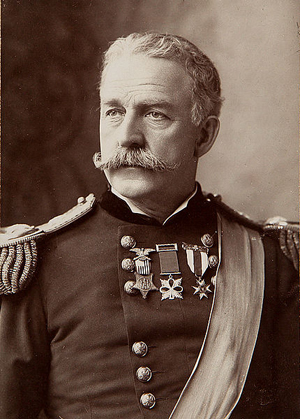MILES, NELSON (1839-1925)

"Nelson Miles Appleton (1839-1925), Collodion print on card" (1898, Brands Studios, Chicago) (Harvard Art Museum/Fogg Museum, Historical Photographs and Special Visual Collections Department, Fine Arts Library)
View largerNelson Appleton Miles ranks among the army's most effective leaders in the Indian wars of the late nineteenth century. Born at Westminster, Massachusetts, on August 6, 1839, he joined the Union army following the First Battle of Bull Run. Though lacking in formal military training, he proved an excellent combat leader. He participated in all of the Army of the Potomac's major campaigns except Gettysburg, suffered three wounds, and emerged from the war a brevet-major general. He supervised the imprisonment of former Confederate president Jefferson Davis at Fortress Monroe, Virginia, from May 1864 to August 1865.
In September 1866 Miles became a full colonel in the reorganized post–Civil War regular army. In April 1869, following Reconstructionrelated duty in North Carolina, he was transferred with the Fifth Infantry Regiment to Kansas. During the next decade Miles commanded troops in a succession of campaigns against Native Americans in the Great Plains–the Red River War (1874–75), the Sioux War (1876–77), and the Nez Perce campaign (1877). He was promoted to brigadier general in 1881 and later helped to organize the capture of Geronimo. After securing a second general's star, he oversaw the Ghost Dance campaign of 1890–91.
In 1895 Miles was appointed commanding general of the army. He led the invasion of Spanish-occupied Puerto Rico during the Spanish-American War but later lost credibility by making sensational, though unsubstantiated, charges that the War Department had distributed "embalmed beef" to American soldiers. He also opposed much-needed structural reform within the army. Upon reaching the mandatory retirement age of sixty-four, Miles retired from active military duty and later unsuccessfully campaigned for the 1904 Democratic presidential nomination. He died in Washington dc of a heart attack while attending the circus with his grandchildren on May 16, 1925, and was buried at Arlington National Cemetery. Egotistical and a shameless self-promoter, Miles had nonetheless established a superb combat record against the Confederates, several groups of Native Americans, and the Spanish.
Robert Wooster Texas A&M University at Corpus Christi
Wooster, Robert. Nelson A. Miles and the Twilight of the Frontier Army. Lincoln: University of Nebraska Press, 1993.
XML: egp.war.028.xml